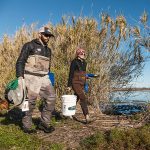Welcome to Monitor Notes, a weekly roundup of news items, event announcements, and updates on past Bay Area Monitor articles.
Take Climate Action

Days before the explosive Glass Fire broke out in Napa and Sonoma counties, the state announced a new way residents can help fight climate change and its devastating effects: California Climate Action Corps. It’s the “country’s first statewide corps” to empower residents to protect their homes, health, and communities, according to a news release. The program is accepting applications for a fellowship with AmeriCorps to support projects in “front-line and low-income communities.” It’s also partnering with cities like San Jose to help recruit volunteers. Sign up for updates as more opportunities are rolled out, whether you have an hour to commit at home, or more time to spare. The announcement followed big tailpipe pollution news requiring all new cars and passenger trucks sold in California to be zero-emission vehicles by 2035.
Home-Based

The Metropolitan Transportation Commission approved a new strategy for the Plan Bay Area 2050 blueprint, based on public feedback and travel pattern changes during the pandemic. The strategy — listed as EN7 — calls for large, office-based employers to have at least 60 percent of their employees telecommute on any given day to reduce greenhouse gas emissions, traffic congestion, and transit overcrowding. Employers could use a variety of options, such as compressed workweeks, flexible work schedules, or remote work policies, to meet the target. A complementary strategy to expand internet access in underserved communities also was added. But opponents urge more review of economic and other impacts.
Public Space Knowledge

Planning nonprofit SPUR is hosting a weeklong series about public space beginning Monday, October 5. “Ideas + Action 2020: Public Space” will discuss how the pandemic and calls for racial justice are challenging views about the ways in which outdoor areas are designed, used, and ever-critical to our wellbeing. Sessions will get into the expanding definition of public space, equitable access, and what parks, sidewalks, and trails might look like in a post-pandemic world. Check the schedule for more topics, speakers, and information. Note that some sessions are free while others require a registration fee. Also, in case you missed it, be sure to check out Aleta George’s exploration of these issues for the Monitor earlier this year.
Fish Tale

Amid a long-term decline in Chinook salmon, researchers have found that rice fields are ideal nurseries for rearing fish, according to the Monitor’s Robin Meadows, who reported in Estuary News on new findings from nearly a decade of testing. In her article, she fishes around the history and importance of the Yolo Bypass, an engineered floodplain where salmon have managed to grow faster than young Chinook elsewhere in the region. She also explains lessons learned by the research team, which had to account for challenges during drought years that threatened the fish habitat. Reel in the article for more insight, including next steps for managing California floodplains for salmon.
Monitor Notes is produced by Cecily O’Connor. To receive it by email, scroll to the bottom of this page, enter your email address in the box under “RECEIVE EMAIL UPDATES,” and click the red “SIGN UP” button.